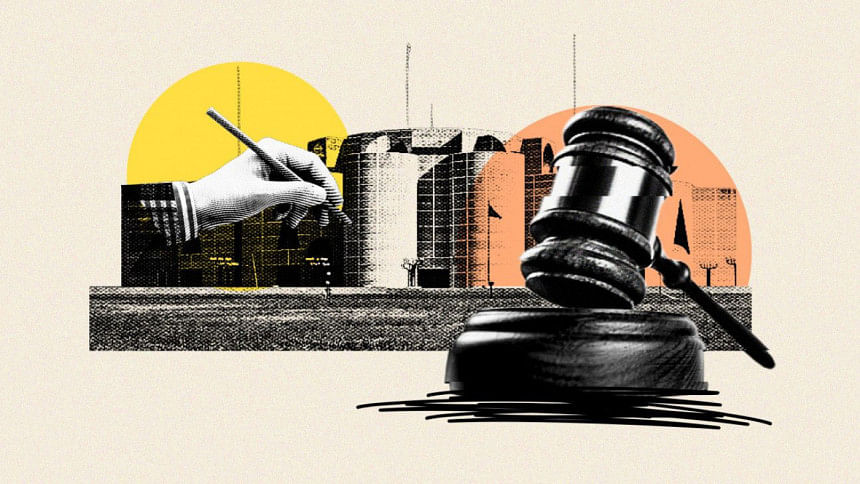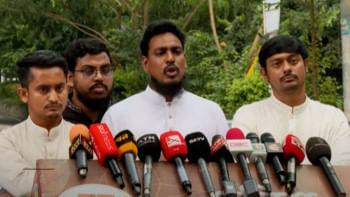Challenging the Fifteenth Amendment through legal doctrine

The book, titled Revolutionary Constitutionalism and Why it was Essential to Declare the Fifteenth Amendment Unconstitutional, by Dr Sharif Bhuiyan, a senior advocate of the Supreme Court of Bangladesh, is inspired by the July Revolution. It highlights some of the most pressing constitutional questions of the time—namely, the constitutionality, legitimacy, and tenure of the current interim government led by Professor Muhammad Yunus. Drawing on the author's oral and written arguments in Badiul Alam Majumder v Bangladesh, the Fifteenth Amendment case (Writ Petition No 9935 of 2024), the book presents, in its fourth chapter, a compelling case for declaring the Fifteenth Amendment of the Bangladesh Constitution illegal.
Since its formation in August 2024, the constitutionality, legitimacy, and tenure of the present government have been subject to persistent scrutiny. Various political parties and civil society actors have demanded that the government step down in favour of an elected one as soon as possible. The first three chapters of the book counter this claim, arguing that the government is both constitutional and legitimate and should remain in office for a reasonable period to implement necessary reforms, including constitutional reform. Bhuiyan supports this stance through a detailed analysis of constitutional provisions, established doctrines, and the theory of revolutionary constitutionalism, set against the backdrop of the political crisis that followed the ouster of former Prime Minister Sheikh Hasina on August 5, 2024.
The book outlines how the government's formation through revolution, its replacement of an authoritarian regime, its "performance" in managing the disorder that followed the Hasina administration's collapse, and the popular demand for change all lend legitimacy to its rule. On the question of constitutionality, Bhuiyan argues that the "constitutional vacuum and crisis" caused by Hasina's flight created a robust legal foundation for recognising the new government as constitutional beyond question. He invokes the "doctrine of necessity"—a principle established in Bangladeshi jurisprudence despite its absence from the text of the constitution—along with Article 7 of the constitution, which affirms that "all powers in the Republic belong to the people." These, he contends, offer a legal rationale for recognising the Yunus-led government as constitutional. Chapter 3 further demonstrates how this doctrine and Article 7 could have been used to address potential vacancies, such as those that would have occurred had the president and speaker resigned after the revolution.
As with questions of constitutionality and legitimacy, the tenure of the current government has sparked ongoing debate, which the book addresses in Chapter 2. By applying constitutional principles and the idea of constitutionalism, Bhuiyan argues that a three-year term would be a reasonable timeframe to allow the government to implement its revolutionary mandate. He also clarifies that the constitutional provision concerning the tenure of the non-party caretaker government (NPCG) is inapplicable to the current government, as the two differ fundamentally in terms of their political context, formation, purpose, operations, and other critical aspects.
Beyond its analysis of the government's constitutional status and tenure, the book offers discussion on constitutional developments following the July uprising. Emphasising the interpretive principles used by the Supreme Court of Bangladesh—notably in the Eighth Amendment case—as well as broader social, political, and historical factors, Bhuiyan argues that the Fifteenth Amendment should be declared unconstitutional. He highlights how the Thirteenth Amendment introduced the NPCG to safeguard democracy and how the Fifteenth Amendment's abolition of this provision has led to "evil consequences," thereby justifying a judicial reversal.
The book also engages with the basic structure doctrine and its origins in Bangladeshi judicial decisions. It examines both substantive and procedural conditions necessary for a valid constitutional amendment. Building on this, Bhuiyan contends that the Fifteenth Amendment amounted to a wholesale rewriting of the constitution, thereby dismantling its core features—including democracy, the rule of law, and fundamental rights. He presents the argument he made in the Fifteenth Amendment case: that the amendment not only undermined these constitutional pillars but also fundamentally altered the democratic and republican character of the state. He concludes that the Supreme Court must declare the amendment unconstitutional to restore democracy, uphold the rule of law, protect people's rights, and prevent further encroachments on the constitution.
While the book serves as a valuable guide to understanding the legal status of the current government, it would have benefited from the inclusion of a few additional topics. For example, it does not delve into the ongoing debate between the concepts of an interim government and a revolutionary government—a tension that frequently emerges in the current administration. However, towards the end of Chapter 4, the book does provide a clear explanation of how the present government differs from the NPCG. Despite this shortcoming, the book stands out as a pioneering intellectual work on the critical constitutional questions surrounding the formation, nature, and function of the current government, as well as on the legality of past constitutional amendments. It offers essential insights for students, academics, and researchers working in the fields of constitutional law, democracy, and legal reform in Bangladesh.
Asma Bint Shafiq is professor at the Department of Law in the University of Chittagong.
Views expressed in this article are the author's own.
Follow The Daily Star Opinion on Facebook for the latest opinions, commentaries and analyses by experts and professionals. To contribute your article or letter to The Daily Star Opinion, see our guidelines for submission.

 For all latest news, follow The Daily Star's Google News channel.
For all latest news, follow The Daily Star's Google News channel. 










Comments